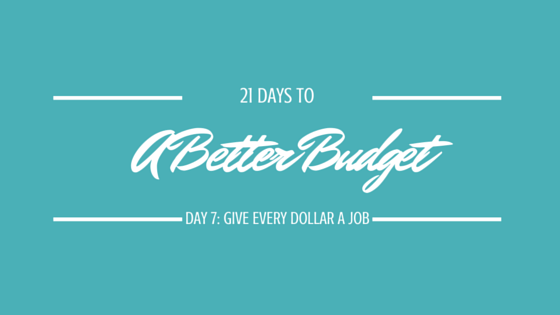
The Why of Budgeting
Most of us work very hard to bring money into our homes. So why is it that for so many people, all that hard work flies out the window as soon as it comes to spending the money? We’ll work hard to bring the money home, but close our eyes and hope for the best when the money goes out? That doesn’t make much sense, does it?
If you want to make sure that your money works as hard for you as you do for it, then you need a budget. A budget is the best way to be INTENTIONAL about your spending and savings, instead of waking up and wondering “Where did it all go?”.
We’ve talked before about how a budget can get a bad rap. Free-spirited people may feel hemmed in – controlled by the budget. Over-worked people may feel “put upon” – as if budgeting is one more thing that they have to do (when they already do so much).
I happen to like the word budget (probably not that much of a shocker), but that’s because I’ve put my own positive spin on it. A budget isn’t telling me what to do. It’s me telling my money what to do. It’s me being in charge of my finances – rather than my financial situation controlling me.
If you hate the word “budget”, pick something else. Try “spending plan” or “strategic allocation plan”. (I kind of like the ring of that.)
The How of Budgeting
Okay, so now that you agree that you need a budget (aka strategic allocation plan) in order to be in charge of your money, guess what you need to start doing?
BEING IN CHARGE OF YOUR MONEY.
That’s right. You need to be the boss. And as the boss, you have three roles: Delegate, Prioritize, and Supervise.
Delegate: Before each month begins, you are going to make sure that every single dollar you bring into your home is assigned a job. These dollars go for the mortgage; those dollars cover utilities; these dollars are for groceries; and those dollars cover retirement savings. Each and every dollar gets a job – intentionally,in writing, in advance (i.e. before the new month begins).
Prioritize: Assuming you’re not Bill Gates, you are faced with the unfortunate reality that your income is finite. Your wants and needs, on the other hand, are not. Your dollars simply can not do all the things, all the time. They need to do the most important ones. You will need to embrace the difficult task of prioritizing how the dollars get spent based on the specific needs of your family. You will need to balance the immediate with the long-term, the practical with the pleasure. I’m not going to sugar-coat it: It can be really hard to be the boss. But there is no one else who can fill this role.
Supervise: Once you have given your dollars their job based on what is most important to your family, it’s time to make sure that your dollars are “performing” their jobs to the best of their ability. Can anyone guess how you are going to do this? By tracking! Yes, you are still going to be doing that! It’s all well and good to tell 700 dollars that their job is groceries, but if you spend $900, then your dollars aren’t listening to their boss. Your budget is going sideways. That is when you need to step in, based on the information you learned from tracking, to re-assess and make adjustments.
Click Here to Subscribe to the FREE 21 Days to a Better Budget Newsletter
Here is what that might look like in very concrete terms. Let’s continue with that groceries analogy. You budgeted $700, but thanks to tracking, you know that on the 20th of the month, you have already spent $675. It’s time to call an emergency budget meeting. (FYI: If you’re married, there are two of you who need to be at this meeting!) You report on your finding – we are about to go over-budget. We only have $25 left to last us the next 10 days.
You can: (a) challenge yourself to only eat out of the pantry until the end of the month, using that $25 to buy a bit of fresh produce, (b) add a few more dollars to your food budget – WHILE making sure to subtract those dollars from another job (you can’t spend more on groceries, without spending less on something else), or (c) a combination of both.
If you go with either (b) or (c), you are going to need to think carefully about where you’re taking that money from – i.e. what jobs you are re-assigning.
Rest assured: The first couple of months of budgeting will be a mess. You will make mistakes. Errors in calculation. Some small, some big. You will realize you gave the wrong jobs too many dollars; or the right jobs not enough. (Hey, it’s not easy being the boss.) There is a learning curve. You will have a lot of those emergency budget meetings.
But as the months go on, this will get much, much easier. You will get better at anticipating your family’s needs and do a more precise job of assigning the dollars to meet them. You will rock this boss thing.
The rest of this week’s emails are going to be focused on exploring the possible jobs that your dollars need to do.
Tuesday: Fixed Expenses
Wednesday: Variable Expenses
Thursday: Future, Annual and Seasonal Expenses
Friday: Breathing Room
Phew, that’s a lot of jobs. And we’re going to cover them all. By the end of this week, you will be a Budgeting Boss. I believe in you.
Click Here to Subscribe to the FREE 21 Days to a Better Budget Newsletter












Leave a Comment